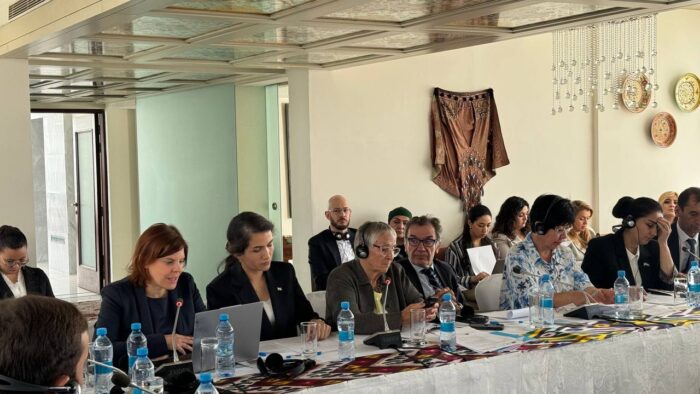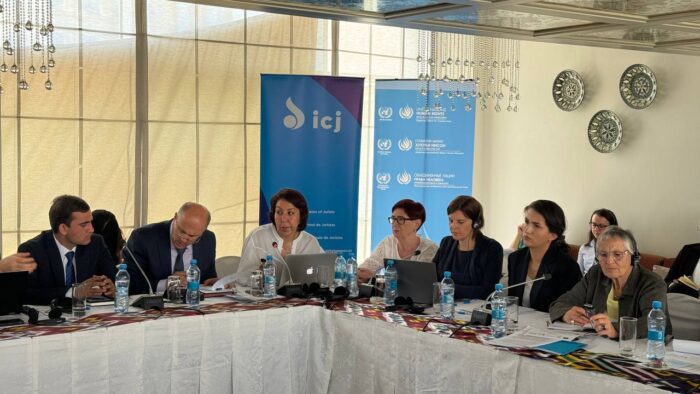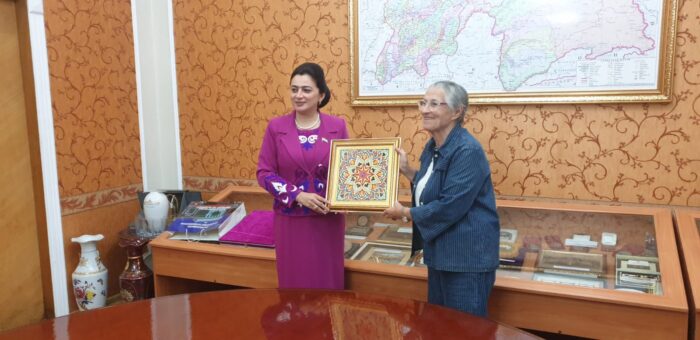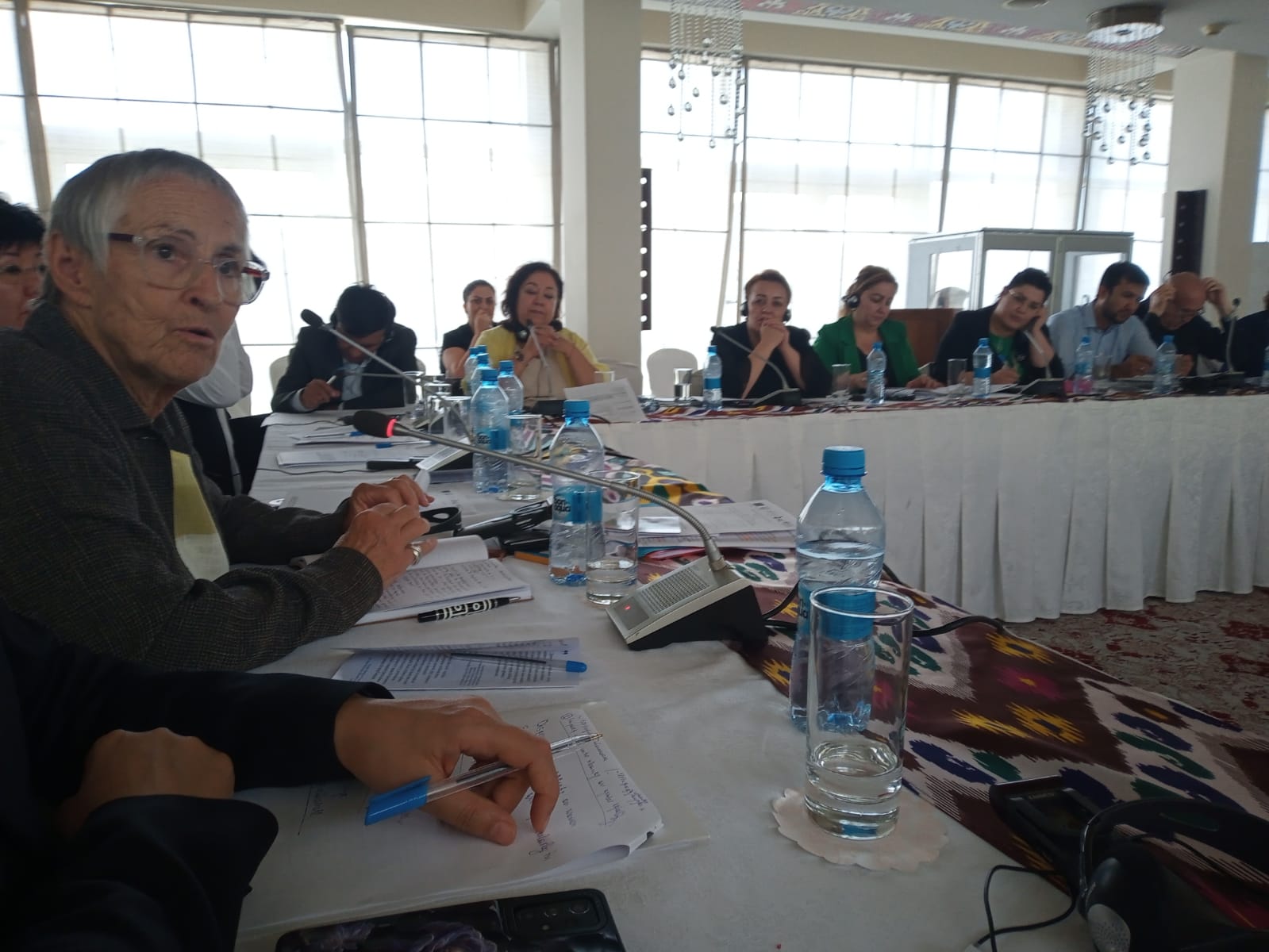From 16 to 19 September 2024, the International Commission of Jurists (ICJ) conducted a mission to Tajikistan, focusing on improving access to justice for women survivors of gender-based violence (hereafter GBV). The mission was organized in collaboration with the Regional Office for Central Asia (ROCA) of the Office of the High Commissioner for Human Rights (OHCHR) and with the national organization Rights and Prosperity in Tajikistan.
The ICJ delegation comprised ICJ Commissioner Patricia Schulz, former member of the Committee on the Elimination of Discrimination against Women (CEDAW), ICJ Secretary General Santiago Canton, and senior ICJ staff members.
Interview with Patricia
During the event, ICJ Commissioner Patricia Schulz touched upon the latest recommendations of the Committee on the Elimination of Discrimination against Women and other treaty bodies for Tajikistan on GBV and criminal justice, highlighting several recommendations that are important for the eradication of GBV more globally.

Patricia, can you remind us what are the recommendations of the UN treaty bodies to Tajikistan on violence against women?
Between 2010 and 2024, five UN international treaty bodies – CEDAW; Committee on the Rights of the Child (CRC); Human Rights Committee (CCPR); Committee on Economic, Social and Cultural Rights (CESCR), and Committee Against Torture (CAT) – made convergent recommendations to Tajikistan on gender-based violence against women and girls.
The issues addressed were gender stereotypes and patriarchal attitudes justifying and enabling GBV; child marriage; low number of complaints, investigations, prosecutions and sanctions; difficult access to justice, insufficient legal aid; very small number of shelters; long delays in improving criminal legislation to address all forms of GBV, including domestic violence (for instance marital rape): the need for strategies, action plans and programs, as well as monitoring mechanisms and data.
What measures can States take to meet their obligations under international law and stop gender-based violence in all its forms? What are the main areas/problems they should address?
First of all, States must take measures, this is an obligation. They must respect, protect and fulfill the right of women and girls to a life free from violence: concretely, they must prevent, investigate, prosecute, sanction, repair and compensate all forms of violence against women and girls, by State agents but also by private individuals, for instance husbands or employers.
The main problem in most countries is the near total impunity that perpetrators benefit from due to a range of factors, such as lack of or insufficient legislation, gender stereotyping, including by actors in the justice system, lack of prioritization of the fight against GBV by all State powers and at all levels of the State, and lack of support for survivors of GBV.

So, in your opinion, how can States not only prevent and stop gender-based violence, but also provide protection and reparation to victims?
Well, States need to adopt good criminal legislation that clearly defines what constitutes gender-based violence, and the types of acts that fall under the criminal code; they must also ensure its systematic implementation. They need competent, gender-sensitive and adequately resourced law enforcement and courts.
They also need to have criminal and/or civil legislation in reparation for survivors of gender-based violence, who must be provided with qualified legal and psycho-social assistance, as well as shelters in urgent cases and decent long-term housing options.
States must prevent violence, particularly domestic violence by individuals, husbands, partners, but also employers. Measures must be available everywhere, including for women living in remote regions or facing specific obstacles, such as disability.
And how could governments prevent violence against women also by non-State actors?
Regarding domestic violence in particular, police, health, social, forensic, educational, judicial services and personnel must be trained to detect cases as early as possible and address them immediately, without gender bias. Once GBV has occurred, measures must be taken and monitored to prevent the repetition of those acts by the perpetrator, such as through eviction, protection, restraining or emergency barring orders.
Concerning GBV in the workplace, again, States need good legislation on sexual harassment and implementation mechanisms that ensure women have access to justice and reparation without fear of losing their job.

Finally, for you, in which ways could State authorities help change the cultural stereotypes leading to gender-based violence in society?
Aw, this is a huge challenge! It means addressing the roots of gender inequality, that is to say unequal power relations based on sex and gender, the social and cultural acceptance of men’s dominance over women, and thus gender-based violence.
This also means addressing women’s economic inequality and poverty that often prevent them from accessing justice, or daring to leave an abusive husband, partner, father.
Action must happen in both the physical and digital worlds. States must take steps to ensure accountability of the media and corporations active in digital technologies responsible for propagating GBV content.
Comprehensive sex education for children should be mandatory in schools. Additionally, media campaigns should be conducted regularly to raise awareness among the whole population about the major harm that GBV inflicts on women as well as their families and communities. States should also support civil society organizations opposing GBV.
Background information
You can find more details on our September event in Tajikistan here: https://www.icj.org/tajikistan-icj-concludes-mission-on-access-to-justice-for-women-survivors-of-gender-based-violence/





